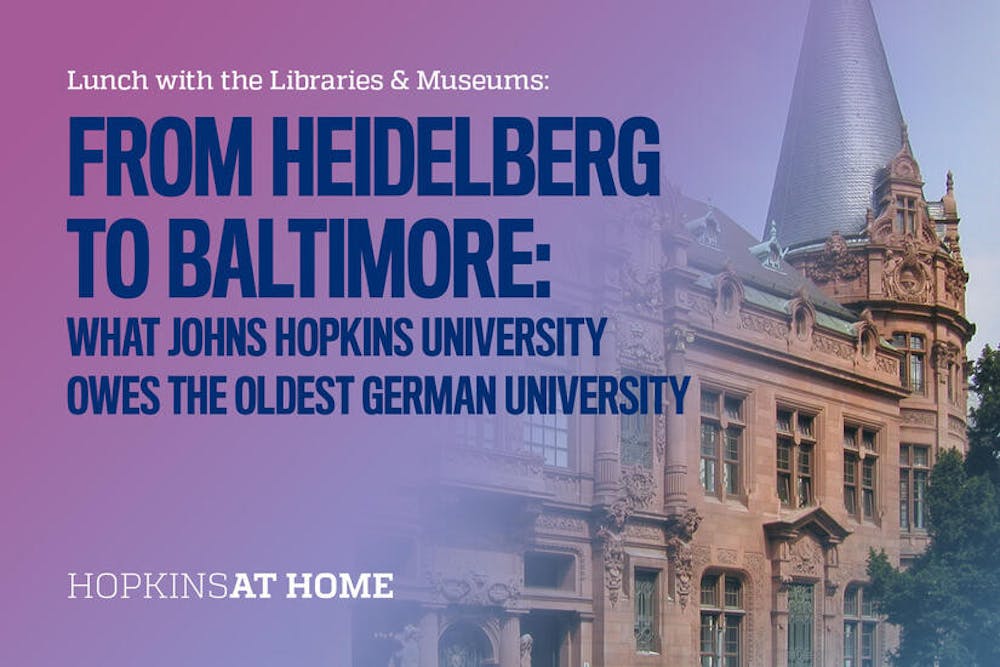On Friday, Oct. 3rd, the Sheridan Libraries and University Museums at Hopkins hosted “From Heidelberg to Baltimore: What Johns Hopkins University Owes the Oldest German University,” the latest installation in the Lunch with the Libraries & Museums discussion series.
The lecture was given by Mackenzie “Mack” Zalin, librarian for classics, comparative thought and literature, Jewish studies, and modern languages and literatures, and moderated by Anne Lester, Associate Professor of Medieval History. They outlined the historical inspirations and insights taken by Hopkins from Heidelberg University, the oldest university in Germany.
Zalin began by describing the basics familiar to many at Hopkins, such as the university’s position as the oldest research university in the U.S. and its influence from a number of German universities. He explained, however, that accounts of this relationship often fail to focus specifically on Heidelberg’s role in shaping Hopkins
“The specific role of Heidelberg University tends either to be taken for granted, or to receive short shrift compared to other German universities, such as Berlin or Göttingen,” Zalin said.
He then led the audience through the history and traditions of Heidelberg, explaining both its founding and its position in 19th-century thought, as well as how pursuit of education and knowledge would evolve as a goal for a number of German universities. This goal, Zalin posited, was what drew many Americans to study in and across German institutions in the 19th century.
“In accordance with the principle of Lernfreiheit, or freedom to learn, many Americans cross-registered at multiple German universities simultaneously,” said Zalin.
Focusing again on Heidelberg, Zalin explored a number of alumni and scholars who were instrumental in the founding and early development of Hopkins. This resulted in an in-depth approach to both academia and education that grew alongside Hopkins, focusing on many of the research-based learning approaches that continue to be used today. One such example is the seminar model.
“Johns Hopkins seminar students were being asked from almost day one of the institution to do more than just regurgitate facts. Rather, they were being asked to produce knowledge based on original research for themselves and their colleagues,” Zalin explained.
Further, Zalin continued, the basis of the Johns Hopkins Medical Institute (JHMI) and Johns Hopkins School of Medicine was inspired by Heidelberg, as was Hopkins’ model of maintaining centers and institutions across Baltimore. Although this decentralized model was popular across many German universities at the time, Zalin explained that Heidelberg’s role in influencing the founding of both JHMI and Johns Hopkins Medicine was nonetheless significant.
The event closed with a Q&A session in which viewers submitted their own queries to both Zalin and Lester. Attendees asked questions ranging from the influence of other German universities on Hopkins to how Hopkins may continue to influence other universities in the way that Heidelberg influenced Hopkins.
In an interview with The News-Letter, Zalin explained how his background as a librarian inspired him to explore the connections between Hopkins and Heidelberg, noting his doctoral dissertation on the narration of origins in Herodotus, a Greek historian.
“Herodotus' Histories represents the first fully-extant work of historical prose in Greek and thus unsurprisingly deals with claims relating to primacy and other superlatives, often in challenging and unexpected ways (e.g., what is really the first/oldest language, what was really the original cause of the conflict between East and West in the ancient Mediterranean world),” Zalin explained. “My subsequent training as a librarian, which taught me how to locate and engage with primary sources in archives and other cultural institutions more efficiently, inspired me to probe similar connections of primacy between Heidelberg, the oldest German university, and Hopkins, the oldest research university in the United States, using resources here in the Sheridan Libraries and beyond.”
Zalin decided to focus on Heidelberg specifically for this discussion because of his understanding that Hopkins owed more to Heidelberg than other German universities. Herbert Baxter Adams, a Hopkins professor who is known to have brought German rigor to America, was closely associated with a seminar-style model.
“My training and interests spurred me to learn more, especially at a time when Hopkins is revisiting its foundations for the upcoming sesquicentennial. As I learned in my research and as I explored in my talk, there's more than a kernel of truth to this claim, but it's not the whole story either,” Zalin wrote. “Nevertheless, Heidelberg's influences on Hopkins are numerous and significant, ranging from instructional and research techniques across the sciences and humanities to the very way in which facilities were constructed and arrayed here in Baltimore.”
Finally, he discussed with The News-Letter how different the undergraduate experience would currently be if Hopkins had not taken inspiration from Heidelberg.
“I think undergraduates at JHU would have fewer opportunities to engage in research,” Zalin explained. “The historical proximity of faculty to grads to undergrads here has made the seminar, which relies on original research by design, the hallmark of a Hopkins education at all levels. Had Hopkins not received and promulgated the model of the seminar from Heidelberg that it ultimately did, undergraduate education might look different.”





